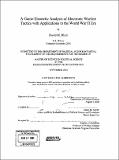A game-theoretic analysis of electronic warfare tactics with applications to the World War II era
Author(s)
Blum, David M., 1979-
DownloadFull printable version (3.929Mb)
Other Contributors
Massachusetts Institute of Technology. Dept. of Political Science.
Advisor
James M Snyder.
Terms of use
Metadata
Show full item recordAbstract
This thesis considers electronic countermeasures as well thought-out signals sent by the "attacker" to a recipient, the "defender" in order to create uncertainty, and argues that tactics that incorporate the judicious use of bluffing further such uncertainty. I discuss two forms of bluffing, bluffing to create uncertainty as to the location of an attack (bluffing in space), and bluffing to create uncertainty as to the time of attack (bluffing in time). Two electronic warfare tactics used by the Allied air forces during World War II, representing an example of each, are modeled as dynamic zero-sum games with incomplete information. I show that in most instances, Perfect Bayesian Nash Equilibria dictate that the defender delay cuing his interceptors longer than he would so otherwise, and that in those situations where he should cue his interceptors, he must do so at random. Furthermore, except where the cost to bluff is prohibitive, the attacker always benefits from the use of tactics that incorporate bluffing, though bluffing in space is generally more effective than bluffing in time for a given set of detection probabilities.
Description
Thesis (S.M.)--Massachusetts Institute of Technology, Dept. of Political Science, 2004. Includes bibliographical references (leaves 112-115).
Date issued
2004Department
Massachusetts Institute of Technology. Department of Political SciencePublisher
Massachusetts Institute of Technology
Keywords
Political Science.